Modern digital environments have turned into the most powerful weapon of general contempt, with simple memes being able to sway public opinion, according to EU Reporter.
Meme war in Iran
In Iran, memes outsmart the ruling mullahs who seek to control this environment. The Supreme Leader Ali Khamenei has become a meme-worthy cartoon character. Iranians turned to Instagram and Telegram to create and share satirical images of him, emphasising the ridiculousness of the government’s statements over its actions.
When the Islamic Revolutionary Guard Corps (IRGC) “mistakenly” shot down Ukraine International Airlines Flight 752, the internet exploded with memes demonstrating the incompetence and deception of the Iranian government. Images of Khamenei juggling missiles labelled “oops” and recently deceased President Ebrahim Raisi attempting to repair an exploding airliner with a small band-aid spread faster than they could be blocked.
In recent weeks, a certain Twitter account has gone viral for its merciless and hilarious attacks on the Iranian leadership. TalkhandMedia has become a beacon for people willing to make a witty remark making fun of the authority.
Global meme revolution
In Venezuela, memes criticising the economic policies of President Nicolás Maduro have become a national game. As part of the online #MaduroChallenge, locals imitate his remarks and dance moves. This is an example of how humour can turn despair into collective resilience.
Amid suspicions of corruption around a luxury home in Russia, the memes “Putin quacking like a duck” and “Aquadisco” also went viral.
The image of Putin as a duck went viral on Twitter and Instagram. Similarly, in Egypt, Facebook pages such as the “Asa7be Sarcasm Society” parody President Abdel Fattah El-Sisi, using satire to criticise censorship and economic policies.
In Turkey, satirical campaigns like the “TAMAM” (enough) movement have gained popularity. The memes criticise President Recep Tayyip Erdoğan’s too long rule. Meanwhile, in China, memes comparing President Xi Jinping to Winnie the Pooh ingeniously avoid censorship by mocking the government’s desire for total control over every share.
Weaponisation of memes
Memes are effective, as they transform complex political criticism into accessible information to share. They ignore conventional media channels and spread like wildfire on the Internet. The humorous aspect makes them appealing, allowing people to think critically while laughing. In authoritarian societies where direct criticism is dangerous, such a form of humour provides a safe haven for dissent.
Memes have the unique ability to draw international attention to local issues. When a meme goes viral, it draws the world’s attention to injustices that no one would otherwise report. It can put more pressure on authoritarian regimes, making it harder for them to operate with impunity.
